Age is the greatest risk factor for developing cancer due to the continuous and life-long accumulation of DNA mutations. Although we have identified causes of childhood cancer, including the inheritance of cancer-predisposing genes, other major contributing factors have not yet been identified. Blood cancer is the most common cancer in children and sequencing data indicate that the first genetic mutations occur during fetal development. Dr. Wagenblast will use human blood stem cells and CRISPR/Cas9-mediated genome engineering to model leukemia evolution and identify biological processes that specifically contribute towards cancer development in children. The goal is to leverage this understanding to identify novel therapeutic targets against childhood blood cancer.

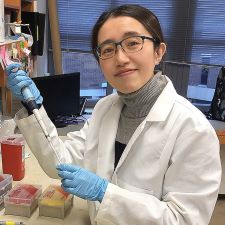
Sex differences are markedly evident in many types of cancer, and one of the major contributors to sex-biased differences lies in the sex chromosomes. In contrast to the traditional view that Y chromosome-encoded proteins only function in male reproductive organs, recent evidence suggests that select Y chromosome-encoded proteins are also expressed in male non-reproductive tissues. Furthermore, dysregulation of the Y chromosome-encoded proteins has been implicated in cancers in non-reproductive organs. Upon closer examination, this subgroup of Y chromosome proteins each has corresponding proteins on the X chromosome. Dr. Liu will study the function of the Y chromosome-encoded proteins and whether and how protein sequence differences from their X chromosome-encoded counterparts lead to functional distinctions in cancer development.
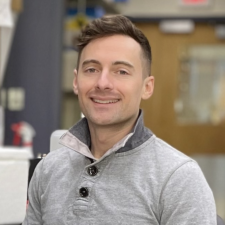
Many cancer diagnostic and treatment strategies use markers on the cell surface to find and kill cancer cells in a sea of healthy tissue. Dr. Flynn's research aims to expand our knowledge of what molecules are found on the surface of cancer cells. He will focus on acute myeloid leukemia (AML), as there is a major unmet clinical need for new curative treatments. Specifically, he aims to define RNA as a new cell surface molecule that could have unique structures on AML cells. With this knowledge he will develop antibodies to selectively detect cancer cells and enable tumor killing. Because tumors from other parts the body also express RNA on their surface, this strategy is expected to be broadly applicable to other cancer types.
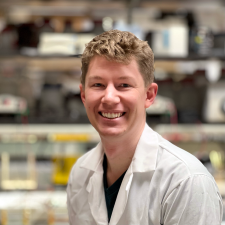
About 70% of pediatric leukemias and 10% of adult leukemias are caused by a genetic disruption in which the mixed lineage leukemia (MLL) 1 gene breaks off and attaches to a different chromosome. This event, known as a chromosomal translocation, gives rise to a distinct subset of leukemias called MLL-rearranged acute myeloid and lymphoblastic leukemias (AML or ALL). Novel treatments for these cancers represent a major unmet medical need. However, the development of therapeutics is hampered by a lack of basic understanding of how the MLL translocations disrupt the function of affected cancer cells. Dr. Farnung will use biophysical and structural biology approaches to visualize how MLL translocations function at the atomic level and influence the important process of gene transcription. His work will elucidate the precise molecular mechanisms that drive acute leukemias and provide a platform for the development of novel therapeutic strategies against these cancers.
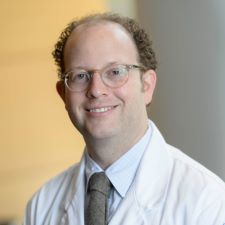
Up to 50% of patients with acute myeloid leukemia (AML) have a genetic alteration called DNA methylation, in which a carbon methyl group is added to the DNA molecule, typically turning the methylated gene "off." A mainstay of therapy is the use of hypomethylating agents, which prevent copying of these modifications during cell division, but this therapy is effective in only 20-30% of patients. Using chemical and genetic manipulation in mouse bone marrow, Dr. Viny [Damon Runyon-Doris Duke Clinical Investigator] aims to determine the effect of DNA methylation on the ability of specific regions of the genome to be accessible to proteins involved with gene expression and other regions to be inaccessible and "silenced." In a prospective phase II clinical trial, he will treat relapsed AML patients with dual hypomethylating agents. By studying these patients' genetic profiles, he aims to determine the genetic features that contribute to therapy response, paving the way for more effective interventions to be developed for patients with acute myeloid leukemia. Dr. Viny was previously a Damon Runyon Fellow.

The microorganisms that live in the digestive tract, also known as the intestinal microbiome, have emerged as important factors in patients' response to cancer therapy. Studies have found that the intestinal microbiome can modulate the anti-tumor immune response to several types of therapy, including chimeric antigen receptor T cell (CAR T cell) therapy, in which a patient's own immune cells are genetically modified to target their cancer. CAR T therapy has led to unprecedented responses in patients with high-risk blood cancers such as leukemia and lymphoma. However, patients may experience disease relapse or CAR-mediated toxicities. Dr. Smith has found that responses to CAR T therapy are linked to alterations in and abundances of the intestinal microbiome. Her research will investigate how the intestinal microbiome mediates this impact on CAR T cells. Dr. Smith was previously a Damon Runyon Physician-Scientist, a complementary award program designed for clinicians interested in research to acquire the skills needed to become physician-scientists.

Chimeric antigen receptor T cell (CAR T cell) therapy, in which a patient's own immune cells are engineered to target their cancer, has changed the treatment landscape for many blood cancers. Despite promising early results, however, long-term follow-up has revealed that nearly half of patients treated with CAR T cells eventually experience cancer recurrence. Using a variety of techniques in cell lines and patient samples, Dr. Singh [Bakewell Foundation Clinical Investigator] aims to understand how interactions between engineered T cells and blood cancer cells in some cases lead to long-term remission, and in others to therapeutic failure. The broad goals of his lab are to understand the biological signals that cause these therapies to fail, and to use this knowledge to design next-generation immunotherapies that can cure more patients.
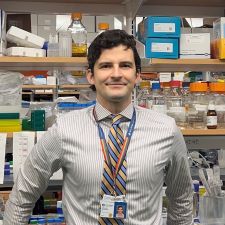
Acute myeloid leukemia (AML) with rearrangements of the KMT2A gene (KMT2A-r) or NPM1 mutation (NPM1m) affect children and adults and can be difficult to treat even with highly intensive therapy. Targeted, less toxic therapies are urgently needed. Menin inhibitors are novel small molecules that block a critical interaction between the KMT2A protein and another protein called menin. This protein-protein interaction is essential in sustaining both KMT2A-r and NPM1m AML. Menin inhibitors have now entered clinical trials for children and adults have shown promising results. However, it has also been demonstrated that up to 40% of patients will develop resistance to a menin inhibitor when it is given alone due to a mutation in the MEN1 gene, which encodes the protein menin. Dr. Bourgeois is investigating whether combination therapy can prevent or overcome MEN1 mutations that confer resistance to menin inhibitors. Additionally, he is developing models to understand how and why resistance to menin inhibitors is sometimes driven by MEN1 mutations, but other times not. The overarching goal of the project is to identify combination therapies that prevent and overcome menin inhibitor resistance and to better understand the different ways in which resistance to menin inhibitors develops.
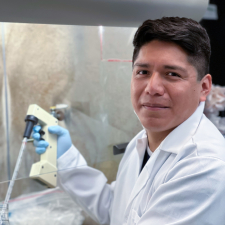
Human cells compact their vast genomes into the small confines of the nucleus by wrapping their DNA into a highly complex structure called chromatin. Packaging DNA into chromatin, however, affects all nucleic acid-transacting machines (e.g., transcription factors) that need to access the genomic information stored in the DNA. NuRD is a large multi-subunit protein complex that plays a major role in making chromatin either accessible or inaccessible. Dysregulation of NuRD and aberrant targeting of the complex can result in the emergence of several types of cancers, including breast, liver, lung, blood, and prostate cancers. Dr. Osorio Valeriano’s [Philip O'Bryan Montgomery, Jr., MD, Fellow] work will reveal mechanistic aspects of NuRD-mediated chromatin regulation and pave the way for the development of novel therapeutic approaches that target cancers more effectively. Dr. Osorio Valeriano received his PhD from Philipps University and his MSc and BSc from the National Autonomous University of Mexico.
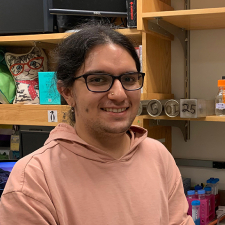
In addition to acute illness, viruses can cause cancers. While our understanding of cellular immunity against viruses that have DNA-based genomes is robust, we know less about how cells protect themselves against RNA-based viruses such as hepatitis C, a leading cause of liver cancer. Because many cellular defenses against viruses are known to be shared between mammals and bacteria, Dr. Mendoza [HHMI Fellow] is looking for new cellular defenses against RNA viruses in bacteria and will investigate how these defenses work. The resulting discovery of anti-viral defenses will broaden our understanding of how cells protect themselves against RNA viruses, which will improve our capacity to support patients' immune systems when infected with cancer-causing RNA viruses. Dr. Mendoza received their PhD from the University of California, San Francisco, and their BS from the University of Miami.
